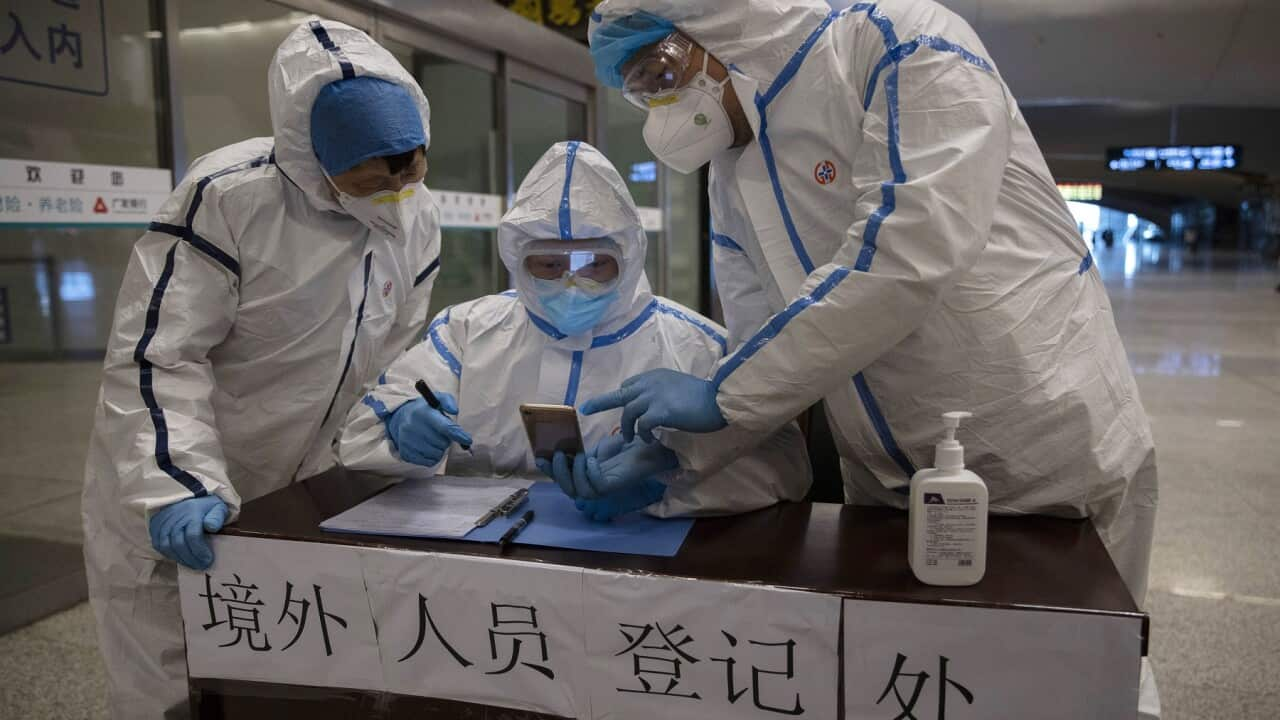President Donald Trump said on Sunday that the peak death rate in the United States from the coronavirus pandemic was likely to hit in two weeks and extended "social distancing" guidelines until 30 April.
"Easter should be the peak number," Mr Trump said of the Christian holiday which falls on 12 April.
"The modelling estimates that the peak in death rate is likely to hit in two weeks," the president said during a briefing in the Rose Garden of the White House.
"It should start coming down - and hopefully very substantially - from that point," he said.
Mr Trump said that he was extending the government's "social distancing" guidelines until April 30 to "slow the spread" of the virus, which has infected nearly 140,000 in the United States and left more than 2,400 dead.
"Nothing would be worse than declaring victory before the victory is won," he said.
"It's very important that everyone strongly follow the guidelines."
Mr Trump also said he expects the country "will be well on our way to recovery" by 1 June - dropping his previous target of Easter.
He said there would be an "important" announcement on Tuesday about the government's plans and strategy going forward.
"On Tuesday, we will be finalising these plans and providing a summary of our findings, supporting data and strategy to the American people," he said.

People walking in New York City during the coronavirus outbreak. Source: Getty
Fauci predicts 200,000 deaths
Senior US scientist Dr Anthony Fauci issued a cautious prediction on Sunday that the novel coronavirus could claim as many as 200,000 lives in the United States, as state and local officials described increasingly desperate shortages in hard-pressed hospitals.
And with stress, uncertainty and exhaustion rising across the country, House speaker Nancy Pelosi squarely blamed President Donald Trump for unnecessary loss of life by initially playing down the pandemic.
"His denial at the beginning was deadly," she told CNN's "State of the Union." She added, "Don't fiddle while people die, Mr. President."
Dr Fauci, who leads research into infectious diseases at the National Institutes of Health, played down worst-case predictions of one million or more deaths, instead offering a rough estimate of 100,000 to 200,000 deaths and "millions of cases."
But Dr Fauci, a leading member of Mr Trump's coronavirus task force and for many Americans a comforting voice of authority, quickly added, "I don't want to be held to that ... It's such a moving target that you can so easily be wrong and mislead people."
By way of comparison, a US flu epidemic in 2018-19 killed 34,000 people. COVID-19 has hit the US with explosive force in recent weeks, following a path seen earlier in parts of Asia and Europe.
COVID-19 has hit the US with explosive force in recent weeks, following a path seen earlier in parts of Asia and Europe.

A Samaritans Purse crew works on building a 68 bed emergency field hospital specially equipped with a respiratory unit in New York's Central Park 29 March, 2020 Source: AAP
It took a month for the US to move from its first confirmed death, on February 29, to its 1,000th. But in two days this week that number doubled, to nearly 2,200 on Sunday. The case total of 124,763 - as tallied by Johns Hopkins University - is the world's highest.
"This is the way pandemics work, and that's why we all are deeply concerned and why we have been raising the alert," Dr Deborah Birx, the response coordinator for the White House task force, said Sunday on NBC.
"No state, no metro area will be spared."
'A sharp escalation ahead'
In the US, the epicenter has been New York City, with 672 deaths so far. Hospital staff have issued desperate pleas for more protective equipment.
Mayor Bill de Blasio said Sunday that his city's hospitals have enough protective equipment for only another week. He said he had made a direct request to Mr Trump and the US military "to find us immediately more military medical personnel and get them here by next Sunday."
Mr De Blasio credited federal officials with being "very responsive," but added, "we're talking about a sharp escalation ahead."
New York governor Andrew Cuomo said the statewide death toll had risen to 965 from 728 a day earlier - its largest one-day jump yet - and he extended by two weeks an order for nonessential state employees to continue working from home.
Early Saturday, Mr Trump had floated the idea of a "quarantine" for New York and two neighboring states, but when state officials and health experts questioned the idea - which Mr Cuomo derided as "preposterous" and "a declaration of war on the states" - the president dropped it.
Instead, the federal Centers for Disease Control issued an advisory urging people in New York, New Jersey and Connecticut to avoid non-essential domestic travel.
In Washington state, where the disease first struck with force, Governor Jay Inslee described "a desperate need for all kinds of equipment." He said the nation needed to be put on an essentially wartime footing.
Mr Inslee pushed back against the notion, advocated earlier by MrTrump, that the country could begin returning to work by Easter, which is April 12.
"There are some hard realities we have to understand," he said on CNN. "Unless we continue a very vigorous social distancing program in my state, this will continue to spread like wildfire."
People in Australia must stay at least 1.5 metres away from others and gatherings are limited to two people unless you are with your family or household.
If you believe you may have contracted the virus, call your doctor (don’t visit) or contact the national Coronavirus Health Information Hotline on 1800 020 080. If you are struggling to breathe or experiencing a medical emergency, call 000.
SBS is committed to informing Australia’s diverse communities about the latest COVID-19 developments. News and information is available in 63 languages at






